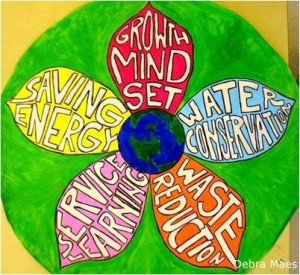We have much more to do and your continued support is needed now more than ever.
McLean, Virginia Eco-School Takes a Big Bite Out of Cafeteria Waste
Churchill Road Elementary School holds a Green Flag award in NWF’s Eco-Schools USA program. One of the school’s major greening projects focuses on waste reduction, and they have implemented an exemplary program resulting in a 90% reduction in the trash they generate. Debra Maes, an educator at the school, explains their achievements in this guest post.
“Trash” has a new meaning at Churchill Road Elementary School in Fairfax County, Virginia. Some of it means money. Some of it means food for the hungry. And some of it means a bumper crop of vegetables this spring.
Churchill Road produces 300 pounds of waste in the cafeteria every day, but throws out only 30 pounds of trash—a reduction of 90%. Where did the waste go? We have redistributed 270 pounds through food donation, recycling, composting and upcycling (see Churchill Road’s waste reduction program in action on WUSA9 News).
Students have learned that nothing is disposable: everything has a value and you just don’t throw it away because you think its trash. After they finish eating, students walk through the “Waste Reduction Line,” separating their unopened foods, recycled items, and compostable fruits and vegetables. Through our program, we redistribute 270 pounds of cafeteria waste each day. These figures add up over the school year, when 51,300 lbs of waste is redistributed by:
- Rescuing 15,200 lbs of unopened food for local food banks
- Composting 15,200 lbs to supply soil for classroom gardens and
- Raised vegetable beds
- Recycling 13,300 lbs in accordance with FCPS requirements to reduce landfills
- Upcycling 7,600 lbs of foil-lined bags through TerraCycle, raising over $2,000
Churchill Road is proud of its Environment-Based Education Program and the connections we make with our students. More than 50 public and private schools have visited Churchill Road to learn from us, hoping to incorporate their own version of a waste reduction program at their schools. We advise these schools to start small and build a strong foundation. The easiest place to start is with food rescue. Food rescue consists of collecting unopened dairy and other food products and then refrigerating or storing the items for weekly deliveries to local food banks. The food rescue aspect of our program strengthens Churchill Road’s strong belief in service learning, which is practiced every school day. It helps to make our students aware that we are an important part of a larger community. This in turn promotes parents’ and community leaders’ involvement in our program.
We have incorporated Environment-Based Education into the curriculum to expand and enhance the students’ ownership of learning with academic, hands-on involvement in the great outdoors. Always mindful of the educational components (including math, science, social studies, language arts, technology, art, etc.), this program helps our students become actively engaged in learning by allowing them to participate in real life situations. It helps students develop a passion and desire to learn. As Principal Don Hutzel states, “Using our environment as a tool for achieving a broader educational goal increases critical thinking skills and enhances leadership roles for our students. Our hope is to encourage lifelong learners and leaders.”
To learn more about environment-based education and how waste-reduction programs can help your school and students, visit the Eco-Schools site today. >>

Debra Maes is an Environmental Studies Educator at Churchill Road ES in McLean, Virginia. Also a parent, Debra saw a need to reduce the amount of waste produced every day in the school. Through Debra’s vision and guidance, the “Waste Reduction Line” was born. Debra’s ultimate goal? Zero waste. Can it be done? She thinks so!





















